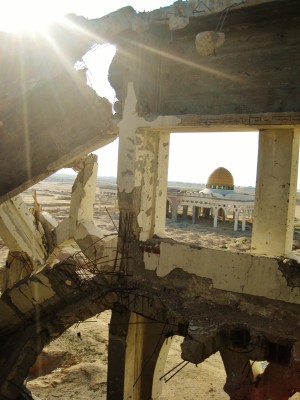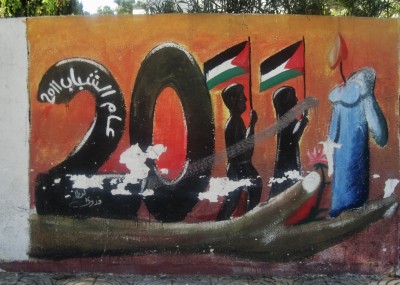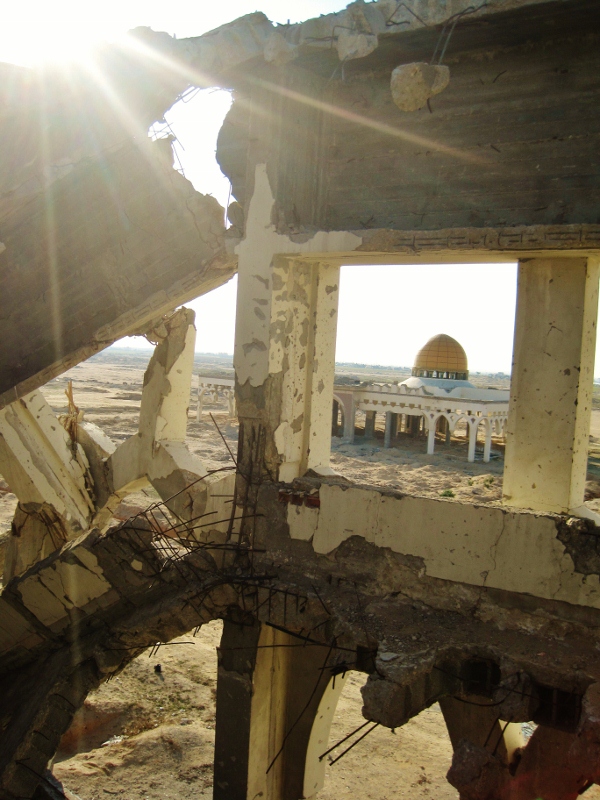by Radhika Sainath
20 December 2011 | Notes from Behind the Blockade
I made the long journey out of Gaza last week. I must say, though I will miss the dozens of people who invited me into their homes, shared their stories, cooked me lunch, put up with my bad Arabic, boiled me countless glasses of rosemary tea and served me thick black coffee in petite rimless cups, I could not get out of there fast enough.

I never thought I’d look so forward to coming to Cairo, a congested, polluted city that I had little love for before the revolution. After a long journey though the Rafah crossing, across the Sinai and back to my hotel off Tahrir Square, I jumped in the shower. And then the humming noise started. I froze, soap bar in hand.
“The drones are really loud,” I said, to no one in particular. They must be quite close. And then I realized, it was just a malfunctioning bathroom fan.
I continued on with my shower, washing my face. The water had a curious scent to it. It also felt gentle and silky. I continue to sniff it, curious. Why, it was the scent of clean water of course! I had grown used to the salty, contaminated water I had been bathing in for two months; water that caused my skin to itch, my hair to smell like an old towel, and to fall out at greater frequency than normal.
Later in the evening, I met up with a friend for a drink nearby. Oh the joys of electricity! Not that the streets around Tahrir have street lights in the American sense — but the stores are lit. And those lights, in turn, made it possible to see where one was stepping! Not so in Gaza, where one has the pleasure of walking around in pitch blackness after 5:30 p.m., listening to Israeli drones overhead. Indeed, the latter half of my going away party took place by candlelight.
Back at the hotel, the shifts had changed and Sami the “bill boy” from two months earlier waited outside.
“Oh hello!” he exclaimed. “Your head is very small,” he said in English. “Before, big, now small.” He gestured with his hand for emphasis. Indeed, I had lost a lot of weight. I switched to Arabic and told him I had been in Gaza, and he made fun of my “Palestinian accent,” pronouncing the “j” as a “j” instead of a “g” as they do in Cairo.
The next morning I awoke to the strange-sounding Israeli F-16s outside my window. Many of them. I unearthed myself from under the covers. I was in Cairo. The Israeli Air Force was not outside, only morning commuters. What a relief! I walked around the city which was filled with things to buy, all kinds of things, spare car parts, stuffed toy camels, circuit boards, Bedouin necklaces, digital cameras and steaming bowls of delicious kushari.
Back in New York City, I found that Gaza had also rendered me unnaturally attuned to the normal sounds of industrial life.

So I’m back in the United States, enjoying the luxury of knowing a foreign government won’t shoot at me, kidnap me, limit my electricity or cause my water to be non-potable. But in the midst of the decorated trees, sparkly lights and mistletoe, I can’t forget that two days after Christmas 2008, Israel launched “Operation Cast Lead”, its 22-day offensive in Gaza, that Palestinians simply call “the War.”

